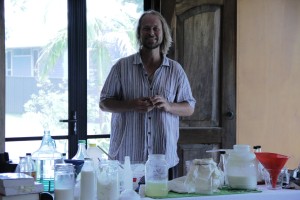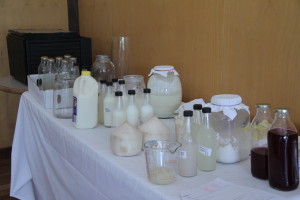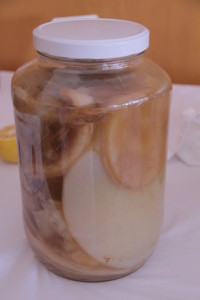One of the aweseome things we did among all the other awesome activities at the recent Food Preparation Intensive Retreat we held in Byron Bay, was attending a fermentation workshop with fermenting guru Tim Mcneilly from Really Awesome Wholefoods.

For most of the guests, fermentation was a total mystery and a food group that they have never really considered adding into their daily diet. For myself, I started my love of fermenting back in the 1980’s with kombucha, and from there developed into making cultured vegetables and kefir’s, although unfortunately I do often let my fermenting slide for long periods of time – but not any more! Tim’s fermenting workshop had us all enthralled, as he both educated and inspired with his fermented creations.
Tim came prepared with all manner of bubbling brews and took us through the process and procedure of creating many different ferments – from beetroot kvass to various flavours of kombucha; from coconut water kefir to milk villi; from goat’s milk kefir to creamy cheeses – we watched, we questioned, we taste tested, and Tim generously shared with us our own kombucha mother (from the kombucha hotel below) as well as water kefir and milk kefir grains. Since the workshop I know I’ve been busily fermenting anything I can get my hands on – and so have many of our guests!
Fermented foods are not normally part of our western culture and our standard types of diet – but they are one food that everyone would pay to eat more of. These foods contain natural probiotics and yeasts that are very beneficial for our bowel. They nourish and cleanse the bowel, they support our immune system, can improve our brain biochemistry and are necessary for our overall health. If we are deficient in probiotics in the bowel (which we can tell from a simple stool test), then it is wise to replace those specific strains with supplemental probiotics – but all probiotics will adhere and culture better, when taken with fermented foods. And having fermented foods in the diet will ensure that probiotic levels in the bowel are maintained and supported.
I highly recommend learning about fermenting and seeing how it is done. Tim Mcneilly will be doing another fermenting workshop at our next Food Preparation Intensive Retreat in June – so keep a watch out for those details!
Happy fermenting!
Leisa
![]()


No comments yet
1 trackback